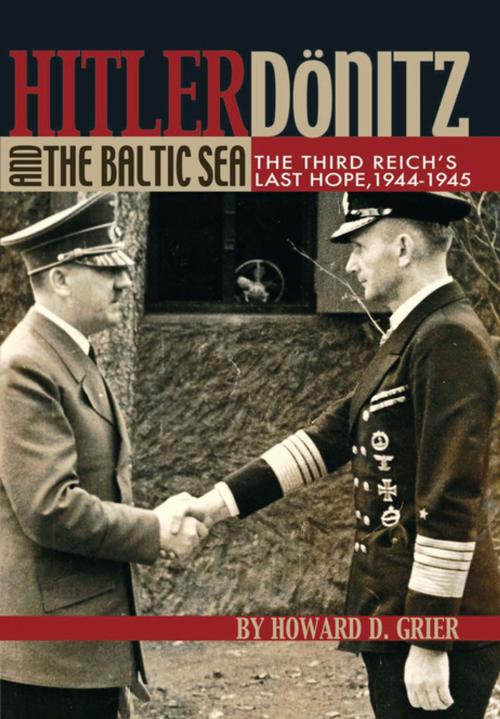Hitler, Donitz, and the Baltic Sea
The Third Reich's Last Hope, 1944-1945
Nonfiction, History, Military, World War II| Author: | David Grier | ISBN: | 9781612514130 |
| Publisher: | Naval Institute Press | Publication: | July 10, 2013 |
| Imprint: | Naval Institute Press | Language: | English |
| Author: | David Grier |
| ISBN: | 9781612514130 |
| Publisher: | Naval Institute Press |
| Publication: | July 10, 2013 |
| Imprint: | Naval Institute Press |
| Language: | English |
The popular conception of Hitler in the final years of World War II is that of a deranged Fuhrer stubbornly demanding the defense of every foot of ground on all fronts and ordering hopeless attacks with nonexistent divisions. To imply that Hitler had a rational plan to win the war flies in the face of widely accepted interpretations, but historian Howard D. Grier persuasively argues here that Hitler did possess a strategy to regain the initiative in 1944-45 and that the Baltic theater played the key role in his plan.
In examining that strategy, Grier answers lingering questions about the Third Reich's final months and also provides evidence of its emphasis upon naval affairs and of Admiral Karl Donitz's influence in shaping Hitler's grand strategy. Donitz intended to starve Britain into submission and halt the shipment of American troops and supplies to Europe with a fleet of new Type XXI U-boats. But to test the new submarines and train their crews the Nazis needed control of the Baltic Sea and possession of its ports, and to launch their U-boat offensive they needed Norway, the only suitable location that remained after the loss of France in the summer of 1944.
This work analyzes German naval strategy from 1944 to 1945 and its role in shaping the war on land in the Baltic. The first six chapters provide an operational history of warfare on the northern sector of the eastern front and give evidence of the navy s demands that the Baltic coast be protected in order to preserve U-boat training areas. The next three chapters look at possible reasons for Hitler's defense of the Baltic coast, concluding that the most likely reason was Hitler's belief in Donitz's ability to turn the tide of war with his new submarines. A final chapter discusses Donitz's personal and ideological relationship with Hitler, his influence in shaping overall strategy, and the reason Hitler selected the admiral as his successor rather than a general or Nazi Party official. With Grier's thorough examination of Hitler's strategic motives and the reasons behind his decision to defend coastal sectors in the Baltic late in the war, readers are offered an important new interpretation of events for their consideration.
In examining that strategy, Grier answers lingering questions about the Third Reich's final months and also provides evidence of its emphasis upon naval affairs and of Admiral Karl Donitz's influence in shaping Hitler's grand strategy. Donitz intended to starve Britain into submission and halt the shipment of American troops and supplies to Europe with a fleet of new Type XXI U-boats. But to test the new submarines and train their crews the Nazis needed control of the Baltic Sea and possession of its ports, and to launch their U-boat offensive they needed Norway, the only suitable location that remained after the loss of France in the summer of 1944.
This work analyzes German naval strategy from 1944 to 1945 and its role in shaping the war on land in the Baltic. The first six chapters provide an operational history of warfare on the northern sector of the eastern front and give evidence of the navy s demands that the Baltic coast be protected in order to preserve U-boat training areas. The next three chapters look at possible reasons for Hitler's defense of the Baltic coast, concluding that the most likely reason was Hitler's belief in Donitz's ability to turn the tide of war with his new submarines. A final chapter discusses Donitz's personal and ideological relationship with Hitler, his influence in shaping overall strategy, and the reason Hitler selected the admiral as his successor rather than a general or Nazi Party official. With Grier's thorough examination of Hitler's strategic motives and the reasons behind his decision to defend coastal sectors in the Baltic late in the war, readers are offered an important new interpretation of events for their consideration.
The popular conception of Hitler in the final years of World War II is that of a deranged Fuhrer stubbornly demanding the defense of every foot of ground on all fronts and ordering hopeless attacks with nonexistent divisions. To imply that Hitler had a rational plan to win the war flies in the face of widely accepted interpretations, but historian Howard D. Grier persuasively argues here that Hitler did possess a strategy to regain the initiative in 1944-45 and that the Baltic theater played the key role in his plan.
In examining that strategy, Grier answers lingering questions about the Third Reich's final months and also provides evidence of its emphasis upon naval affairs and of Admiral Karl Donitz's influence in shaping Hitler's grand strategy. Donitz intended to starve Britain into submission and halt the shipment of American troops and supplies to Europe with a fleet of new Type XXI U-boats. But to test the new submarines and train their crews the Nazis needed control of the Baltic Sea and possession of its ports, and to launch their U-boat offensive they needed Norway, the only suitable location that remained after the loss of France in the summer of 1944.
This work analyzes German naval strategy from 1944 to 1945 and its role in shaping the war on land in the Baltic. The first six chapters provide an operational history of warfare on the northern sector of the eastern front and give evidence of the navy s demands that the Baltic coast be protected in order to preserve U-boat training areas. The next three chapters look at possible reasons for Hitler's defense of the Baltic coast, concluding that the most likely reason was Hitler's belief in Donitz's ability to turn the tide of war with his new submarines. A final chapter discusses Donitz's personal and ideological relationship with Hitler, his influence in shaping overall strategy, and the reason Hitler selected the admiral as his successor rather than a general or Nazi Party official. With Grier's thorough examination of Hitler's strategic motives and the reasons behind his decision to defend coastal sectors in the Baltic late in the war, readers are offered an important new interpretation of events for their consideration.
In examining that strategy, Grier answers lingering questions about the Third Reich's final months and also provides evidence of its emphasis upon naval affairs and of Admiral Karl Donitz's influence in shaping Hitler's grand strategy. Donitz intended to starve Britain into submission and halt the shipment of American troops and supplies to Europe with a fleet of new Type XXI U-boats. But to test the new submarines and train their crews the Nazis needed control of the Baltic Sea and possession of its ports, and to launch their U-boat offensive they needed Norway, the only suitable location that remained after the loss of France in the summer of 1944.
This work analyzes German naval strategy from 1944 to 1945 and its role in shaping the war on land in the Baltic. The first six chapters provide an operational history of warfare on the northern sector of the eastern front and give evidence of the navy s demands that the Baltic coast be protected in order to preserve U-boat training areas. The next three chapters look at possible reasons for Hitler's defense of the Baltic coast, concluding that the most likely reason was Hitler's belief in Donitz's ability to turn the tide of war with his new submarines. A final chapter discusses Donitz's personal and ideological relationship with Hitler, his influence in shaping overall strategy, and the reason Hitler selected the admiral as his successor rather than a general or Nazi Party official. With Grier's thorough examination of Hitler's strategic motives and the reasons behind his decision to defend coastal sectors in the Baltic late in the war, readers are offered an important new interpretation of events for their consideration.















